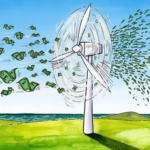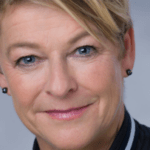Het is gelukt: de Republikein Ron Johnson heeft de Democraat Russ Feingold verslagen in de senaatsrace in Wisonsin. De politieke aardverschuiving in Amerika heeft daarmee niet alleen geleid tot een absolute no go situatie ten aanzien van welk klimaatbeleid dan ook. Nee, met Johnson zit nu naast James “We won, you lost, get a life” Inhofe een tweede aartsscepticus in de Senaat.
Hierboven de video van een journaalitem op MSNBC waar de nieuwslezeres hoogst verbaasd reageert als ze hoort dat er überhaupt nog iets tegen de settled science is in te brengen. Hier het teleurgestelde bericht op Motherjones.com dat een denier in de senaat komt. Hier een artikel uit de campagnetijd waarin 8 (in alarmistische ogen natuurlijk onbetrouwbare) wetenschappers zeggen: “Johnson’s stance is the correct one”. Hier een artikel uit the American Spectator waarin Paul Chesser Johnson’s klimaatuitspraken ziet als een uitglijder en hij zich afvraagt:
Oh my! Can he possibly overcome such a blunder?
Om vervolgens een uur later met een eerlijke aarzelende update te komen nadat Willie Soon de auteur op de ingezonden brief heeft gewezen. Hij sluit de update af met:
It continues from there.
En dat is wat het doet. The story goes on. We have not yet reached the gate…
Hieronder nog een democratische spot die niet heeft mogen baten:






Tsja…
De motivatie van de kandidaat klinkt tamelijk oudbakken, niveau Great Global Warming Swindle (overigens een uitstekende documentaire, maar we zijn inmiddels wel drie jaar verder).
Ik betwijfel of de man veel inzicht heeft in de klimaatmaterie.
In de VS gaat het niet over de waarheid over het klimaat, maar over je politieke standpunt, met name ten aanzien van staatsbemoeienis. (Zie ook: http://climategate.nl/2010/09/28/heartland-confer… )
Klimaatbeleid is links en pro overheids ingrijpen dus is een republikein (en zijn kiezers) tegen. Maar het is wel een teken aan de wand dat hij er zonder enige terughoudendheid voor kiest om zijn standpunt als absoluut naar voren te brengen. Blijkbaar verwacht hij geen linkse republikeinen te verliezen en wel rechtse democraten aan te trekken.
Ik denk dat dat wél de actuele verhoudingen weergeeft.
Wat dan ook bleek uit de uitslagen.
Een paar commentaren van skeptische Heartland coryfeeën geven aan dat de strijd in hun ogen nog lang niet gewonnen is:
In addition to re-electing Barbara Boxer to the Senate and returning Jerry Brown to the governors mansion, California voters resoundingly rejected Proposition 23, which would have delayed the states unrealistic greenhouse gas emissions law until its unemployment rate returned to a reasonable level. So expect the already-high rate of businesses and jobs leaving the state to escalate.
Elsewhere in the country, in places where environmental extremists ran their largely Democratic candidates against so-called Big Oil and Big Coal, they suffered resounding defeat. Mostly pro-traditional energy candidates produced huge swings in their favor in states like Pennsylvania, Virginia, Ohio, Indiana, Wisconsin, and Michigan. Voters realized that these important industries produce valuable jobs and feed their families, and to demonize them is wrong.
If during its lame-duck session Congress chooses to take up even a portion of their cap-and-trade agenda, such as a national Renewable Electricity Standard, they will severely misread or worse, ignore the message sent to them by the electorate.
Paul Chesser
Special Correspondent
.
Both Darrell Issa and Jim Sensenbrenner will chair committees in the Republican-controlled House — the Committee on Oversight and Government Reform, and Select Committee on Energy Independence and Global Warming, respectively.
Both have already announced their intention to investigate Climategate and related matters. But can they do this without knowing the relevant climate science and the scientists? Seems to me they will need the cooperation of the Science Committee, likely to be chaired by Dana Rohrabacher.
S. Fred Singer, PhD
Chairman, Science & Environmental Policy Project (SEPP)
Policy Advisor to The Heartland Institute
.
Yesterday's election gives hope, yet pause, from a free-market public policy perspective. It's encouraging the big-government agenda pursued the past two years (and beyond) finally met some resistance from voters and candidates.
Bruce Walker
Managing Editor
En nu maar hopen dat de opwarming niet doorzet!
En nu maar hopen dat de afkoeling niet doorzet!